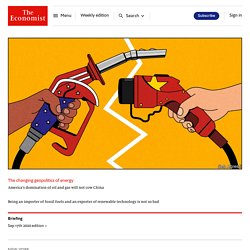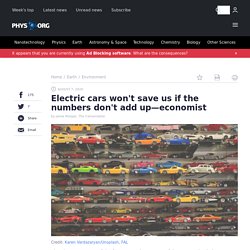

Electric Cars Are Coming. How Long Until They Rule the Road? Around the world, governments and automakers are focused on selling newer, cleaner electric vehicles as a key solution to climate change.

Yet it could take years, if not decades, before the technology has a drastic effect on greenhouse gas emissions. One reason for that? It will take a long time for all the existing gasoline-powered vehicles on the road to reach the end of their life spans. This “fleet turnover” can be slow, analysts said, because conventional gasoline-powered cars and trucks are becoming more reliable, breaking down less often and lasting longer on the road. The average light-duty vehicle operating in the United States today is 12 years old, according to IHS Markit, an economic forecasting firm.
“Engineering quality has gotten significantly better over time, in part because of competition from foreign automakers like Toyota,” said Todd Campau, who specializes in automotive aftermarket analysis at IHS Markit. Age of cars and light trucks on U.S. roads. EVgo: Electric Vehicle (EV) Charging Stations. תחבורה ציבורית חשמלית. First all-electric auto service station. The first all-electric auto service station will open in Britain on Monday as drivers increasingly avoid cars fueled by gasoline and diesel.

It’s another sign the energy and transport industries are gearing up to deal with as many as 30 million electric vehicles on the road by 2040. Prime Minister Boris Johnson plans to phase out traditional engines in cars from 2030 and set the most agressive target in the Group of 20 nations for slashing greenhouse-gas emissions. The station in Essex, southeast England, is the first of 100 electric facilities that Gridserve and Hitachi Capital U.K. Plc. are planning and is part of a 1 billion-pound ($1.35 billion) program to roll out the stations across the country. It includes 36 rapid chargers powered only by renewable energy. GM, Ford Need Electric-Car Batteries, but Take Different Paths to Get Them. The changing geopolitics of energy - America’s domination of oil and gas will not cow China. For more coverage of climate change, register for The Climate Issue, our fortnightly newsletter, or visit our climate-change hub “THE UNITED STATES OF AMERICA is now the number-one energy superpower anywhere in the world,” President Donald Trump told oilmen in Midland, Texas this summer, from a stage decorated with gleaming black barrels.

The sheer volume of hydrocarbons that such American oilmen have released from the shale beneath Midland and previously unforthcoming geology elsewhere gives substance to his boast (see chart 1). Over the past decade America’s oil output has more than doubled and its gas production increased by over 50%. America is now the world’s top producer of both fuels.
Had they heard Mr Trump say that “We will never again be reliant on hostile foreign suppliers,” presidents from Franklin Roosevelt on might have nodded in envious approval. But what it might mean to be an energy superpower is changing, thanks to three linked global shifts. Electric cars - Who will rule the Teslaverse? A RECENT VIDEO of Elon Musk taking a spin in a new all-electric Volkswagen with Herbert Diess, the German carmaker’s boss, set tongues wagging.

VW was forced to deny that a deal with Tesla was in the offing. A deeper bromance between Mr Musk’s firm and his main rival in the market for electric vehicles (EVs) looks unlikely. But the meeting highlights how the car industry is at last taking the impending EV revolution seriously. Transportation_zero_emissions. EV Maker Workhorse Is Pairing Vans With Drones to Drive Deliveries. Text size.

Another EV Company Is Going Public. Here’s What You Need to Know. Text size Yet another electric-vehicle company is becoming publicly traded via an acquisition with a special purpose acquisition company, or SPAC.

This time it’s Hennessy Capital Acquisition buying Canoo. Canoo is a self described business-to-consumer electric-vehicle company. It’s EV as a service. Drivers, essentially, rent a futuristic looking VW-type van the company calls Beta. Electric cars won't save us if the numbers don't add up—economist. Electric cars are one of the fastest growing sectors of the automotive industry.

Record sales are being made despite the economic crisis posed by the coronavirus pandemic. Seven years ago, there were only 3500 plug-in cars in the UK—there are now 300,000. Almost 120,000 of them run purely on battery power. Many view the current period, even though it coincides with the pandemic, as a watershed moment – a shift in consumer sentiment is expected to lead to a surge in electric vehicles. All the major car manufacturers are now launching pure battery electric models and many governments and municipalities are legislating and regulating to encourage ownership. Cleaner transport is important for many reasons, not least meeting carbon emissions targets. This is because the fundamental issues are social and political, not merely technological. Hidden emissions. Bloomberg Finance LP. Biggest Green Stimulus .docx. מצגת שר האנרגיה ועדת הפנים והגנס 22.7. 2030summary. Private electric transportation readiness guide for municipalities_20190303144538.766.
משרד הבינוי והשיכון מקדם תוכנית מהפכנית לטעינת כלי רכב חשמליים בבנייני מגורים. האצת רכבים חשמליים. Bloomberg Finance LP.